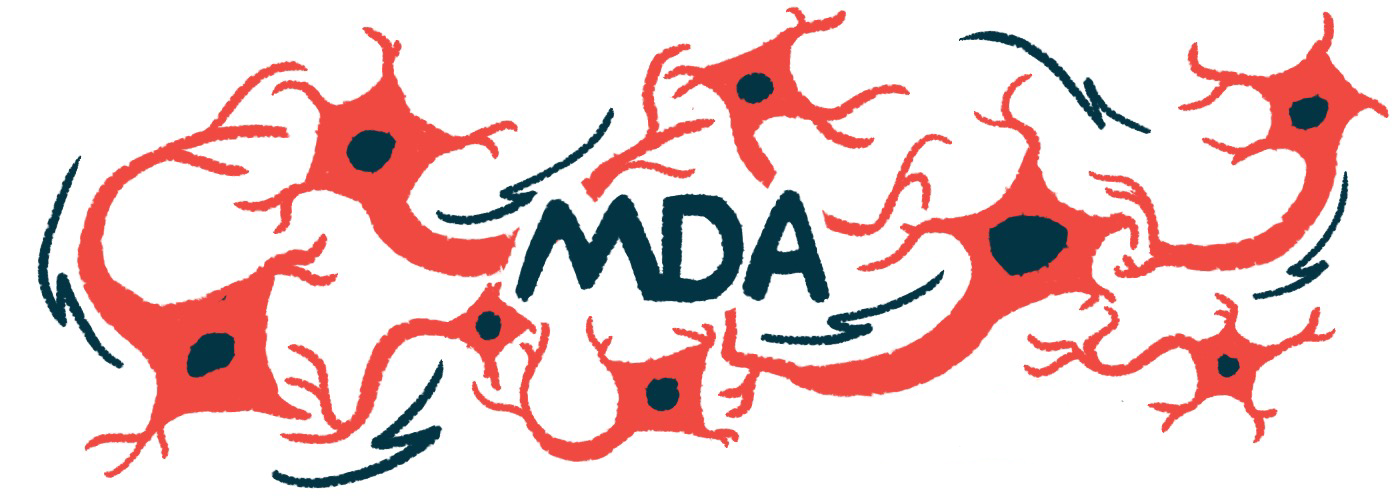MDA 2023: COYA 302 therapy slows ALS progression in early trial
Developer Coya hopes to start larger Phase 1b/2 study later this year

Four people with amyotrophic lateral sclerosis (ALS) each experienced a marked slowing in disease progression with COYA 302, an experimental immune-modulating therapy tested in a small proof-of-concept clinical trial, according to Coya Therapeutics, its developer.
Based on these findings, Coya is planning to start work on further trials to test the therapy candidate in larger groups of ALS patients. Pending regulatory approvals, the company hopes to begin Phase 1b/2 clinical testing later this year or early next year.
“We believe the results of this initial proof-of-concept study in a small number of ALS patients are encouraging and warrant conducting a larger and controlled industry-sponsored study,” Adrian Hepner, MD, chief medical officer of Coya, said in a company press release.
Stanley Appel, MD, chair of Coya’s scientific advisory board and a trial investigator at Houston Methodist Research Institute, in Texas, shared the study’s findings at the Muscular Dystrophy Association’s MDA Clinical & Scientific Conference, held March 19-22 in Dallas. His talk was titled, “Novel Treg-modulating Immunotherapy Targets Inflammation in ALS.” The work was funded in part by Coya.
Seeking to slow disease progression in ALS
COYA 302 contains a combination of the immune signaling molecule IL-2 and a fusion protein known as CTLA4-Ig or abatacept. It is administered via subcutaneous (under-the-skin) injection.
The therapy is designed to reduce inflammation by increasing the activity of regulatory T-cells — a type of anti-inflammatory immune cells known as Tregs — while simultaneously decreasing the activity of pro-inflammatory immune cells
Inflammation in the nervous system, termed neuroinflammation, is “an extremely important part in propagating neuronal injury in ALS,” Appel said.
Coya recently forged an agreement with a global pharmaceutical company known as Dr. Reddy’s Laboratories for the production of COYA 302. Under the agreement, Coya will produce the IL-2 component of the therapy — which the company is also developing separately under the name COYA 301 — while Dr. Reddy’s will provide the CTLA4-Ig part of COYA 302.
“We believe that the combined resources of both organizations strengthens our chances to bring this therapeutic modality to patients with neurodegenerative diseases if approved by regulatory authorities,” Howard Berman, PhD, Coya’s CEO, said in a press release announcing the agreement.
In the proof-of-concept clinical trial, four ALS patients were treated with COYA 302 for 48 weeks, or about one year. The participants then were followed for an additional eight weeks (about two months) after they stopped receiving the medication.
The therapy was generally well tolerated, with no serious side effects reported. The most common side effects were injection site reactions that were mostly rated as mild.
“Safety and tolerability went very very well in these patients,” Appel said, noting that the injection reactions seen were similar to reactions that are common with other injectable therapies like insulin.
ALS progression slowed, ALSFRS-R scores show
The participants’ symptom severity and functional abilities were measured with the ALS Functional Rating Scale (ALSFRS-R), in which higher scores indicate a better ability to function. Prior to starting the study, the participants’ ALSFRS-R scores were decreasing at a rate of about 1.1 points per month on average.
At the start of the study (baseline), the average ALSFRS-R score was 33.5 points. Halfway through the study, at week 24, the average score was stable at 33.75 points. After 48 weeks of treatment, the average score had declined less than two points to 32. The difference in scores from the start of the trial to its end was not statistically significant.
These results indicate that ALS progression was slowed considerably while patients were receiving treatment with COYA 302. However, after treatment with COYA 302 stopped, patients showed rates of disease progression resembling those before treatment, going from 32 points in the ALSFRS-R scale to 30 in about eight weeks.
“The average patient decline, as measured by ALSFRS-R, is approximately -1-point/month. In the present study there was no average decline from baseline to 24 weeks and we observed minimal average decline from baseline to 48 weeks,” Appel said.
“To us, this was truly exciting to go 48 weeks and have the patients doing as well as they were, with good safety and good tolerability,” he said.
We believe the results of this initial proof-of-concept study in a small number of ALS patients are encouraging and warrant conducting a larger and controlled industry-sponsored study.
Analyses of immune cell function indicated that the therapy was working as designed: data suggested that Treg activity increased during the 48 weeks of treatment with COYA 302, then decreased again once patients were off the therapy. Other markers of inflammation and oxidative stress — a type of cell damage associated with inflammation — also decreased with COYA 302 treatment.
“The therapy was well tolerated, and most significantly it enhanced [Treg] suppressive functions, suppressed markers of oxidative stress, and ameliorated disease progression over 48 weeks,” Appel said. He added that these findings suggest COYA 302 “may provide a potentially meaningful approach for the ‘unmet need’ in ALS.”
Appel stressed that further studies will be needed to conclusively evaluate the efficacy of COYA 302.
But he added, “We’re very excited about where we are as the preliminary proof of concept.”
Coya also is developing a cell therapy called COYA 101, in which Treg cells are administered as a form of treatment. Data from early trials of that therapy also have suggested reductions in oxidative stress and slower ALS disease progression.








